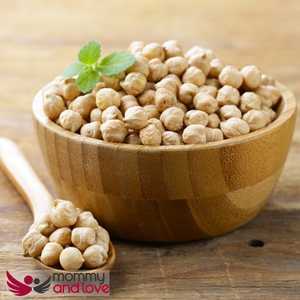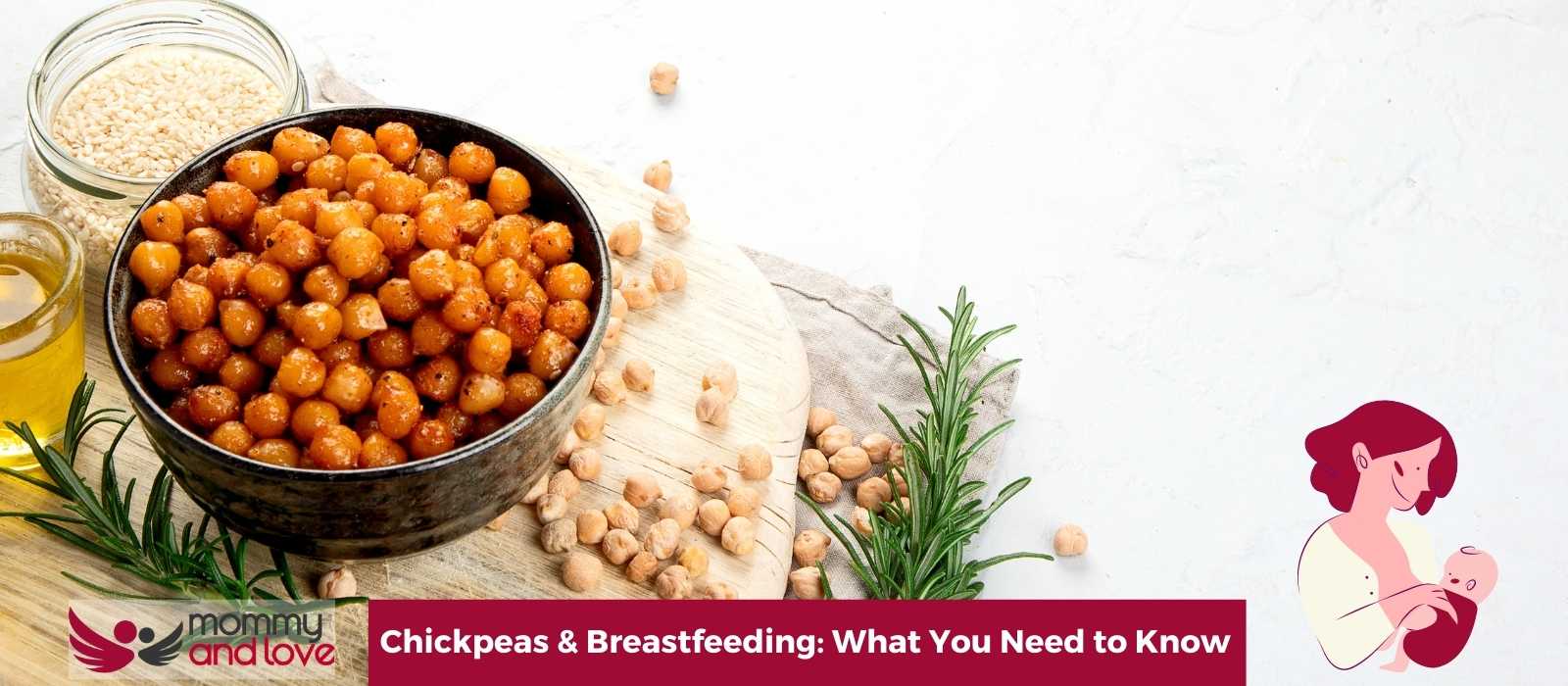Chickpeas & Breastfeeding: If you are a breastfeeding mom, you may be wondering if it is safe to eat chickpeas. This is a question that comes up frequently, as chickpeas are a popular food choice.
In this blog post, we will discuss the benefits of eating chickpeas for breastfeeding moms.
What Are the Health Benefits of Eating Chickpeas While Breastfeeding?

Chickpeas contain a variety of B vitamins, minerals, healthy fats and other nutrients such as plant estrogens that may benefit both you and your baby. They’re high in complete protein and dietary fiber.
They also contain small amounts of iron, zinc vitamin C and vitamin B. Furthermore, chickpeas are a good source of essential fatty acids, including omega-3s.
A 1/2 cup serving of cooked chickpeas contains only 1 gram of saturated fat and no cholesterol.
Many doctors recommend limiting daily saturated fat intake to less than 16 grams for most adults to keep their hearts healthy while breastfeeding or if you’re pregnant. Chickpeas may help you meet this goal since they’re relatively low in saturated fat compared to other foods such as cheese, highly processed foods or red meat products.
Chickpeas have high fiber and protein content which makes them good for nursing mothers who want to lose baby weight so you can add chickpeas to your diet. However, it is always a good idea to get professional medical advice, weight loss and fitness tips from a doctor or licensed health care providers.
Do Chickpeas Cause Gas in Babies?
Chickpeas, also called garbanzo beans, are legumes—a class of vegetables that includes beans, lentils and peas. They contain carbohydrates known as oligosaccharides, which are not broken down in the digestive tract.
Instead, these molecules pass through the small intestine to the large intestine where they are fermented by gut bacteria. This fermentation process produces gas, as the body attempts to digest chickpeas and other foods containing oligosaccharides. This affect won’t pass through your milk though.
How Many Chickpeas Can You Eat While Breastfeeding?
There’s no need to worry if you’re enjoying a few chickpeas while breastfeeding or if you’re pregnant. In fact, chickpeas are considered a healthy food and are a great source of nutrition for both mother and baby. They can be part of a healthy diet for nursing moms. They’re packed with protein, fiber, vitamins, and minerals, and they can help increase milk for your baby.
However, if you’re having too many and notice an increase in gas and discomfort for both you and your new baby, take note. So, like with anything else, consume them in moderation.
Chickpeas are also one of the primary ingredients of hummus. So eat hummus in moderation if you’re gassy.
Do Chickpeas Have an Effect on Breast Milk Quality?
The fiber in chickpeas may also help with some of the most common issues that can come along with breastfeeding, such as constipation.
Breastfeeding mothers are encouraged to consume an additional 500 calories above what they would normally eat. These calories should be added to your normal diet slowly over time to prevent weight gain and digestive discomfort.
Adding foods like chickpeas that contain high amounts of fiber and nutrients is a good way to make sure your body is getting the proper nutrition it needs while breastfeeding.
Fiber can also help you feel full longer, reducing cravings and hunger pangs which can lead to unhealthy snacking or overeating.
While eating enough fiber is important, excessive intake of dietary fiber (such as from eating too many chickpeas) could rarely have adverse effects on breast milk production by causing gas or bloating in your baby if he or she drinks your breast milk after you have eaten them yourself; so take care when adding any new nutritious food into your diet for the first time!
Do Chickpeas Help Increase Breast Milk Production?

On top of the question, “Can I even eat this food?”, there’s a common concern about what chickpeas will do to your baby. Specifically, will chickpeas increase breast milk supply?
While there are no studies specifically addressing chickpeas and breast milk supply, one study did find that an increase in galactagogue foods (foods that promote lactation) was associated with an increase in breastmilk volume.
Lactogenic foods include fenugreek, fennel, garlic sesame seeds, oatmeal and barley.
Chickpeas are believed by some to be a galactagogue food and have been consumed as such since ancient Egyptian times which means they can help you produce more breast milk. In order to reap the maximum benefits of chickpeas as galactagogue foods to increase your milk, you might want to pair them with other lactation foods that are thought to help boost breastmilk production and help you produce more breast milk like oats or flax seeds.
Get the scoop on increasing milk supply with our helpful article: How to naturally increase milk supply.
Conclusion
Having chickpeas while breastfeeding is not only safe, but it may also have some benefits for both mother and baby. Chickpeas are a good source of nutrition and can help increase milk production. Just be sure to eat them in moderation to avoid any digestive discomfort.
If you’re looking for ways to increase your breast milk supply, consider adding chickpeas to your diet. Pair them with other galactagogue foods like garlic, oats or flax seeds for maximum effect.
FAQ
What Foods Cause Gas in Breastfed Babies?
There are a few different things that can cause gas in breastfed babies. One of the most common is an intolerance to lactose, which is found in cow’s milk. Another possible cause is eating certain foods such as too much fruit or vegetables such as broccoli and cabbage as well as spicy foods, which can lead to trapped air in the intestines.
Having a gassy stomach can lead to an increased risk of trouble sleeping and irritability so it’s best to know what caused it.
What Should You Avoid Consuming While Breastfeeding?
Read our blog post all about foods to avoid while breastfeeding. In the meantime, here’s a quick summary!
- Herbal supplements – Supplements made from herbs are usually not regulated so it’s best to avoid them.
- Caffeine – Caffeine can be found in a lot of foods and drinks such as energy drinks and coffee. Chocolate also contains caffeine. So drink them in moderation or avoid them completely.
- Seafood high in mercury should be avoided.
- You shouldn’t drink alcohol excessively.

This article was written by Sandra Baker – full time writer and the mother of four amazing kids (including twins!)
She’s also a breastfeeding counselor and has spent years helping new parents learn how to care for their children. When she’s not writing or caring for her children, Sandra likes to spend time reading and taking walks with her husband.




